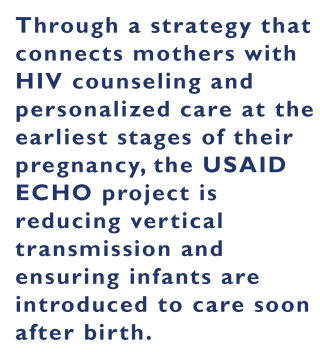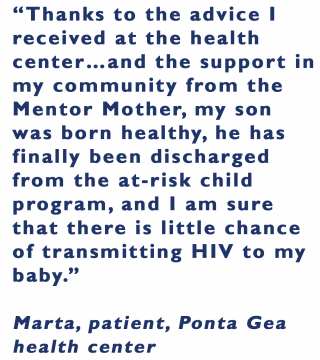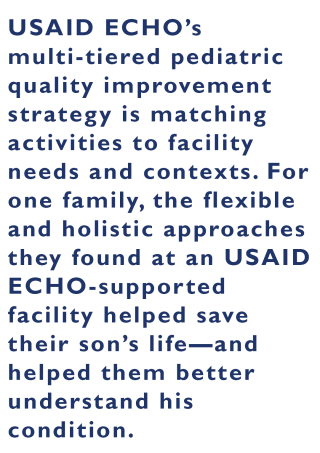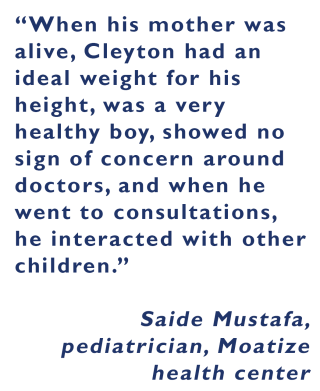
Mozambique suffers from one of the highest rates of HIV transmission from mothers to newborn children, a rate of 13% compared to the 2% global average. Testing, care, and treatment for children with HIV pose enormous challenges to the country’s already overstretched medical system. Responding to this critical need, USAID/Mozambique implements Efficiencies for Clinical HIV Outcomes (ECHO). ECHO’s goal is to ramp up efforts to prevent mother-to-child transmission by targeting pregnant women at each stage before and after birth of their child.

When this work began, 1 in 3 women did not know their HIV status prior to their prenatal consultations. By 2022, as a result of this project, HIV testing coverage for pregnant women rose to 100 percent in health facilities that are supported by USAID ECHO and linkage to treatment reached 99%. That means virtually all women who test positive receive access to HIV treatment. At the same time, newborn testing coverage increased from 86% to 90%.
USAID ECHO developed several strategies to reach children with pediatric HIV testing. They trained nurses to track infected women who give birth in a facility’s maternity ward and quickly link their infants with an at-risk child consultation. Mentor Mothers, who typically live in the same community as the expectant mothers are also essential to the approach in preventing mother-to-child transmission of HIV. The mentors follow a mother through every stage of her pregnancy, ensuring she and her child receive testing and do not fall through the cracks.

Marta, a newly tested patient living with HIV, visited Ponta Gea health center, one of the USAID ECHO supported facilities, for a consultation for the expected birth of her child. She was in denial over her HIV status and refusing to undergo treatment. A maternal and child health nurse met Marta in a counseling session and encouraged her to accept the diagnosis and explore treatment options. Throughout her pregnancy and after, Marta received support from Mentor Mothers and nurses that helped her feel supported and stay healthy.
Marta’s son, Stefan, was born without HIV. Even though he was healthy, Stefan continued to attend at-risk child consultations. He recently graduated from the program and his risk of contracting the virus is nearly zero. During her visits to the health center, Marta always stopped by her counselor’s office to greet the person who helped coach her through her difficult diagnosis.
Since implementing this comprehensive strategy to reduce mothers’ transmission of HIV to their newborns, USAID ECHO has helped an ever-growing number of pregnant women learn their HIV status. This early testing supports increased treatment, improves viral suppression for mothers and their children, and decreases mother-to-child transmission significantly. Healthier mothers and children represent the foundation for a better educated and more prosperous Mozambique.
Saving Lives: a Viral Load Success Story
Improved pediatric care in Mozambique from USAID supported interventions leads to reduced HIV viral load
Current treatment options for HIV/AIDS are so effective that despite being incurable, people can live with an undetectable level of viral load. To reach its country-wide targets, Mozambique needs to expand viral load testing coverage, which was just 63% at the start of the USAID Efficiencies for Clinical HIV Outcomes (ECHO) project. Facing this challenge, USAID ECHO developed a strategy to accelerate viral load coverage that follows a cascading design with four distinct interventions.

The first intervention, and the most intensive, focuses on hiring a task force of health providers to identify patients eligible for testing, coordinate screenings, facilitate sample collection, and coordinate with laboratories to get samples tested. This is implemented at high-volume facilities. The intermediate intervention contains similar activities but works through internal health unit staff, specifically at facilities that provide patients with one-stop entry-point screening and treatment for HIV-related illnesses. The basic intervention has the same contents but is rolled out to all USAID ECHO-supported health units. Finally, the viral load demand creation intervention promotes activities that raise awareness through messages on community radio stations, educational activities, community health lectures, and viral load literacy programs for young people and adolescents.
This four-pronged strategy has yielded strong results. In June 2022, USAID ECHO reached 71% in viral load testing coverage program wide. Tete Province had the best results, reaching 83% in viral load coverage and 93% in suppression.
Cleyton, a 7-year-old patient who was born with HIV, provides one tangible example of ECHO’s impact on pediatric outcomes. As recently as 2021, Cleyton was undetectable and frequently visited the Moatize health center in Tete with his mother, who was diligent about treatment. When his mother passed during childbirth less than a year later, at-home attention to Cleyton’s care and treatment abruptly declined.


Cleyton started responding negatively to his medication, and his family halted treatment. As part of a USAID ECHO-led initiative, his doctors transitioned him to a better treatment regimen. When challenges persisted, they recommended Cleyton for pediatric counseling. Psychologists took the time to understand the child’s at-home experiences, challenges, and relationships, finally identifying medicine administration issues with his family. This honest and empathetic care uncovered the root causes of Cleyton’s health challenges. Due to the USAID ECHO interventions, at his most recent visit, Cleyton’s viral load was undetectable again.
Building viral suppression in Mozambique requires a flexible approach. USAID ECHO’s strategy ensures that facilities with the most need receive targeted technical assistance. It also ensures that patients have a menu of resources available to them, from One-Stop pediatric care to psychosocial support when traditional problem-solving fails. Understanding each patient’s individual needs, providers at USAID ECHO-supported facilities are matching patients with the right care for them and their families. Ensuring that they live long, healthy, and prosperous lives.
